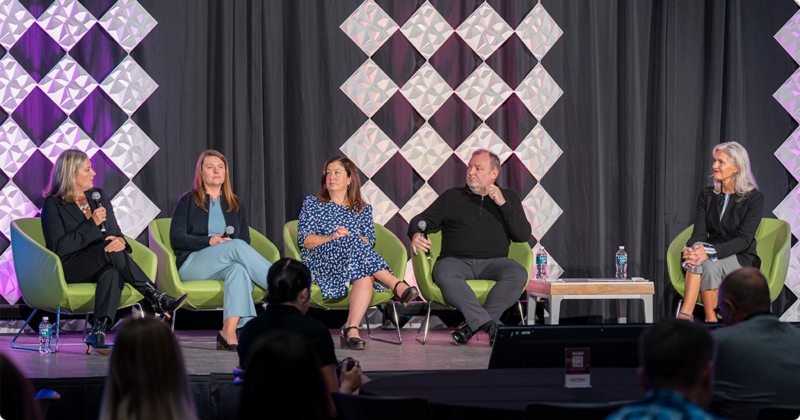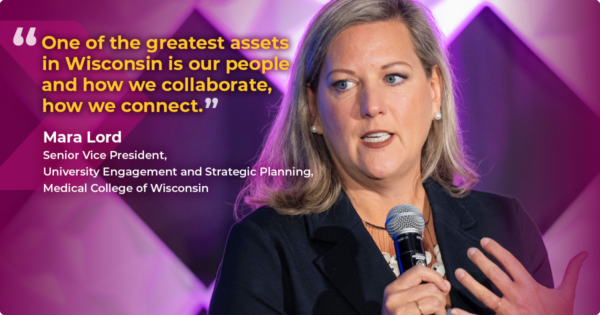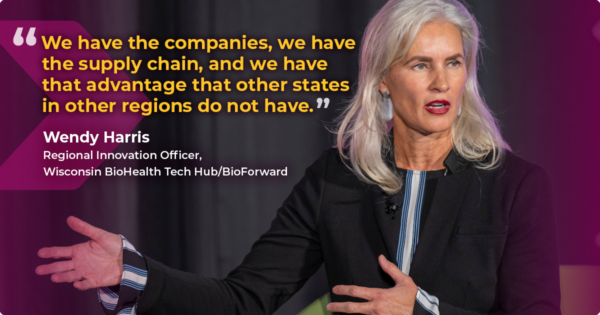
Members of the “Innovation in Wisconsin: Biohealth and Personalized Medicine at the Forefront” panel at the Wisconsin Economic Summit 2024 in La Crosse, from L to R: Mara Lord, Katie Boyce, Lindsay Blumer, Kurt Zimmerman, and moderator Wendy Harris
To usher in a brighter health care future, Wisconsin partners innovated, broke down barriers, and forged collaborations to leverage a $49 million federal grant to create the Wisconsin Biohealth Tech Hub.
Those partners from government, academia, civic leaders, and the business community pulled together in an unprecedented effort to earn recognition for Wisconsin as a global leader in biotech and personalized medicine.
“One of the greatest assets in Wisconsin is our people and how we collaborate, how we connect. And this was a really great example of a lot of individuals checking egos at the door,” said Mara Lord, senior vice president and chief strategy officer at the Medical College of Wisconsin. “I believe that collaboration and that ability to move at the speed of trust showed.”

The 18 partners’ success was detailed at WEDC’s Wisconsin Economic Summit at the La Crosse Center on Oct. 15-16, one year after the hub’s announcement.
Katie Boyce, senior director of corporate impact and community relations at Exact Sciences, said the main challenge in drafting a successful proposal was staying focused with so many good ideas in play.
“We worked hard to make sure that Wisconsin could show up with one unified voice,” she said.
The federal investment, along with a $7.5 million state contribution and $32 million from the private sector, will accelerate the development of biohealth solutions and entrepreneurship, including in the areas of medical imaging, genomics, and big data.
It aims to create 30,000 direct jobs in the biohealth sector, plus another 100,000 indirect jobs, as it helps deliver economic and national security and build competitiveness.
Lindsay Blumer, president and CEO of WRTP-Big Step in Milwaukee, said that more than half of the jobs created will not require a bachelor’s degree. The tech hub also opens a path to a more diverse skilled workforce, she said.
“This opportunity provides us a way to welcome every single Wisconsinite into the workforce,” said Blumer. “Creating those micro-career pathways … is vitally important … It’s a great opportunity for us to ensure that we have the foundations and the infrastructure for this work to happen for personalized medicine.”
Wendy Harris, regional innovation officer for the tech hub, said Wisconsin was chosen from a pool of 382 applicants for the federal grant partly because of the demonstrated strength of the biotech sector in Wisconsin. The state is home to more than 460 suppliers.

“The reason we won is because those places don’t make things. We make things here in Wisconsin,” Harris said. “We have the companies, we have the supply chain, and we have that advantage that other states in other regions do not have. So, they can talk a good game, but then they come to Wisconsin to make things.”
The initiative also aims to establish a cyber-secure repository of expansive health data, fueling innovation and reducing the cost and time required to bring new therapies to market.
“This will be an incredibly important tool for companies in Wisconsin so that they can better understand, from a composite perspective with a holistic view of the population, how to develop the best, most effective targeted technologies and products,” said Kurt Zimmerman, senior director of bio-industry partnerships at the University of Wisconsin-Madison School of Medicine and Public Health.
Boyce said she envisions a bright future for the initiative as it encourages further discovery and entrepreneurship.
“What we want to see in the next five to 10 years are the next 10 to 15 Exact Sciences,” she said. “How do we connect all of these dots between research, venture capital, and manufacturing?”
